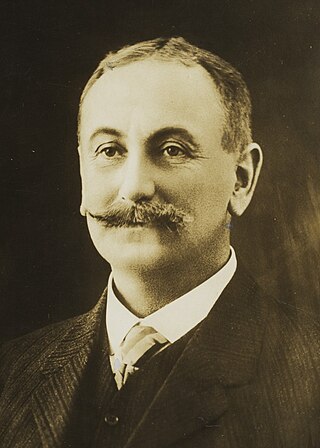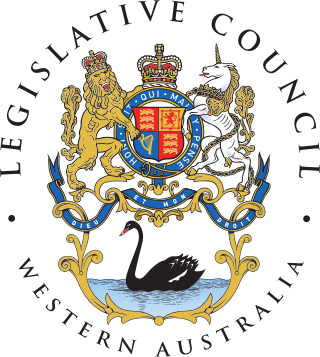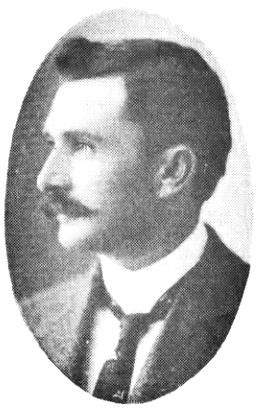
Frank Wilson, was the ninth Premier of Western Australia, serving on two separate occasions – from 1910 to 1911 and then again from 1916 to 1917.

The Western Australian Legislative Council is the upper house of the Parliament of Western Australia, a state of Australia. It is regarded as a house of review for legislation passed by the Legislative Assembly, the lower house. The two Houses of Parliament sit in Parliament House in the state capital, Perth.

John Scaddan, CMG, popularly known as "Happy Jack", was Premier of Western Australia from 7 October 1911 until 27 July 1916.

Sir Henry Bruce Lefroy was the eleventh Premier of Western Australia.

The electoral district of Perth is a Legislative Assembly electorate in the state of Western Australia. Perth is named for the capital city of Western Australia whose central business district falls within its borders. It is one of the oldest electorates in Western Australia, with its first member having been elected in the inaugural 1890 elections of the Legislative Assembly.
This is a list of members of the Western Australian Legislative Assembly between the 1914 election and the 1917 election, together known as the Ninth Parliament. The re-election of Premier John Scaddan's Labor Government with a 26-24 majority in 1914 was tempered when, a year later, Labor member Joseph Gardiner's seat was declared vacant on account of his non-attendance and a Liberal was elected in his stead, and Labor became a minority government when on 18 December 1915, Edward Johnston resigned from the Labor Party and became an independent. On 27 July 1916, the Scaddan Ministry was defeated and the Liberals' Frank Wilson became the new Premier.
This is a list of members of the Western Australian Legislative Council from 22 May 1916 to 21 May 1918. The chamber had 30 seats made up of ten provinces each electing three members, on a system of rotation whereby one-third of the members would retire at each biennial election.
Hubert Stanley Wyborn Parker DSO VD was an Australian politician who represented the Western Australian Legislative Assembly seat of North-East Fremantle from 1930 until 1933, and one of the three Legislative Council seats for Metropolitan-Suburban Province from 1934 until 1954. He was a member of the Nationalist Party until 1945, when the party merged into the Liberal Party. He was also a qualified solicitor and distinguished military officer who served at Gallipoli and in France during World War I.

Sydney Stubbs CMG was an Australian politician who served twice in the Parliament of Western Australia: in the Legislative Council from 1908 to 1911, and then in the Legislative Assembly from 1911 to 1947. He was Speaker of the Legislative Assembly from 1930 to 1933, and had been Mayor of Claremont and then Mayor of Perth prior to entering parliament.

Sir James Daniel Connolly was an Australian politician who served in both houses of the Parliament of Western Australia. He was a member of the Legislative Council from 1901 to 1914 and a member of the Legislative Assembly from 1914 to 1917, and served as a minister in the governments of Newton Moore and Frank Wilson. Connolly spent much of his later life in the United Kingdom, where he served as agent-general for Western Australia and Malta.

Robert Thomson Robinson was an Australian lawyer and politician who was a member of the Legislative Assembly of Western Australia from 1914 to 1921, representing the seat of Canning. He served as a minister in the governments of Frank Wilson, Henry Lefroy, Hal Colebatch, and James Mitchell.
Sir Robert Ross McDonald QC was an Australian politician who was a member of the Legislative Assembly of Western Australia from 1933 to 1950, representing the seat of West Perth. He served as leader of the Nationalist Party from 1938 to 1945, and of the Liberal Party from 1945 to 1946, during the period when those parties were the junior partners in the coalition with the Country Party.

Francis Edward Sykes Willmott was an Australian politician who was a member of both houses of the Parliament of Western Australia, serving in the Legislative Assembly from 1914 to 1921, and then in the Legislative Council from 1921 to 1926. He was the leader of the Country Party from 1915 to 1919.

Alexander Robert Richardson was an Australian pastoralist and politician. He made a fortune through the development of pastoral leases in the North-West, and later served in both houses of the Parliament of Western Australia. He was a member of the Legislative Council from 1887 to 1890 and a member of the Legislative Assembly from 1890 to 1897, and served as a minister in the government of John Forrest.
Henry Willoughby Mann was an Australian police officer and politician who was a Nationalist Party member of the Legislative Assembly of Western Australia from 1921 to 1933, representing the seat of Perth.

Thomas Percy Draper CBE KC was an Australian lawyer, politician, and judge. He was a member of the Legislative Assembly of Western Australia from 1907 to 1911 and again from 1917 to 1921, and was attorney-general in the first government of Sir James Mitchell. He later served on the Supreme Court of Western Australia from 1921 to 1939.

Sir Norbert Michael Keenan QC was an Australian lawyer and politician who was a member of the Legislative Assembly of Western Australia from 1905 to 1911 and again from 1930 to 1950. He was the leader of the Nationalist Party from 1933 to 1938, during the time when it was the junior partner in the coalition with the Country Party. Keenan had earlier served as a minister in the government of Newton Moore and the second government of Sir James Mitchell.
Albert James Wilson was an Australian politician who was a member of the Legislative Assembly of Western Australia from 1904 to 1908, representing the seat of Forrest.
Thomas Duff was an Australian businessman and politician who was a Nationalist Party member of the Legislative Assembly of Western Australia from 1918 to 1921.
Winston Churchill lost his seat of Dundee in the 1922 general election as a National Liberal follower of David Lloyd George. The election was the only time a challenger standing as a prohibitionist was elected as an MP in the UK.













